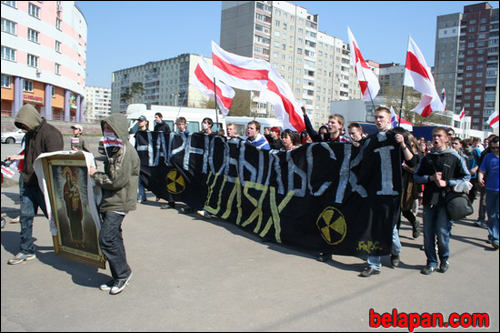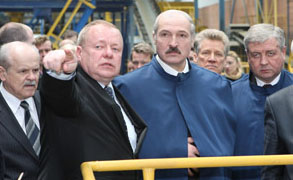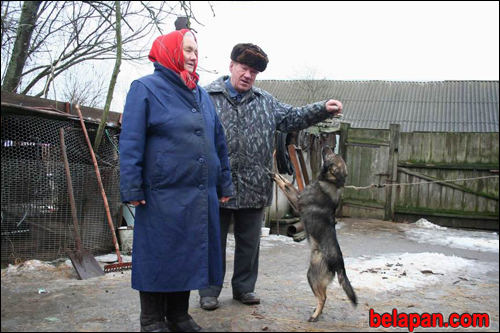A day of the 23rd Chernobyl catastrophe anniversary was traditionally remembered in Minsk by a Chernobyl Šlach, a Belarusian opposition gathering. From 400 to 1000 people took part in the peaceful rally. Find photo coverage here.  However, elsewhere in the provinces similar demonstrations were blocked by police.
However, elsewhere in the provinces similar demonstrations were blocked by police.
The uncovenient Chernobyl truth
In Viciebsk (north Belarus regional city) civil activists were detained even before they started a rally. Police was waiting for them on a place of gathering.
Police officers checked for IDs and demanded that demonstrators show their personal belongings. In backpacks they found T-shirts with anti-nuclear signs, which young people were going to wear during the rally.
Aliaksej Pialevich, Ales Halavan, Kastus Ivanou, Iryna Piatrova, and Valery Ramanenka were detained and escorted to the Pieršamajski police precinct. Police explained that they would like to verify whether the youth were related to several crimes committed in the city recently.
Siarhej Kavalenka and Valeryia Misnikava were also escorted to a police office. They were considered ‘potential suspects.’
In Lida (Hrodna region, west Belarus) the No to a new Chernobyl rally participants Hanna Bunko, Yauheni Rudy, and Yauheni Skrabets were arrested. Young people, wearing chemical protection respirators, gave out information flyers about dangers of building a nuclear power plant in Belarus. Yauheni Skrabets was sentenced to one day in jail.
In Astraviec (Hrodna region), a proposed site for a nuclear power plant, police confiscated anti-nuclear newspapers from a group of senior citizens.
Nuclear ambitions
The Belarusian president Aliaksandr Lukashenka announced that a nuclear power plant would be built near Astraviec, not far away from the Lithuanian border. Most probably Russian companies would be contracted for the job.
Population of the country, a quarter of whose territory is contaminated with radionuclide since the Chernobyl (Ukraine) catastrophe in 1986, took the idea of a plat critically.
However, the official Minsk, used to make decisions ‘behind closed doors’, does not facilitate any discussions on the topic and is defiant to any threats. It looks more like the Soviet Moscow that was for a long time covering up from people the Chernobyl catastrophe fact, which happened on 26 April 1986.
According to the officials a Belarusian nuclear power plant would secure energy independence of the country.
Country’s leadership is trying to reduce the importance and significance of Chernobyl consequences. Lukashenka plans to ‘quickly and effectively’ revitalise the most contaminated regions.
Scientists, who warn about dangers of the repopulation of the nuclear fall-out zone, have to hide elsewhere outside Belarus.


